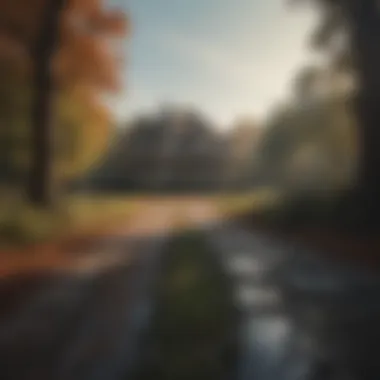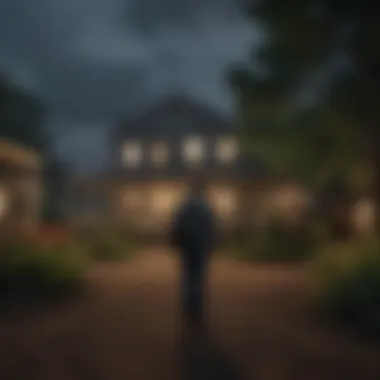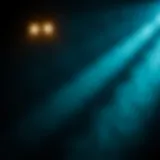Exploring the Intricacies of Lovecraft Country


Intro
Lovecraft Country is a complex television series that requires careful analysis of its themes and narrative structure. The show intricately weaves elements of horror with historical reality, creating a rich tapestry that speaks to the nuances of race and identity in America. From the very beginning, it becomes clear that Lovecraft Country is not merely set in a world of monsters but rather one where the true monstrosities lie within societal constructs and racial injustices.
Overview of the Entertainment, TV Show, or Film discussed
Background Information
Lovecraft Country is based on the novel of the same name by Matt Ruff. It premiered on HBO in August 2020 and quickly established itself as a significant work of television. The creators, Misha Green, Jordan Peele, and J.J. Abrams, crafted a series that both honors and critiques H.P. Lovecraft's influence on American horror. The integration of horror motifs into a narrative addressing historical and contemporary racial issues invites viewers to engage with its content on multiple levels.
Brief Synopsis of the Plot
The story follows Atticus Turner, portrayed by Jonathan Majors, who embarks on a journey across 1950s America searching for his missing father. Accompanied by his friend Letitia (Jurnee Smollett) and uncle George (Courtney B. Vance), Atticus faces not only the horrors of supernatural creatures but also deep-seated racism that permeates society. The series navigates through different stories in each episode, blending reality with fiction, making the audience constantly question the line between historical truth and horror fantasy.
Key Details about the Creators and Cast
The collaboration between Misha Green, who serves as the showrunner, and notable producers like Jordan Peele, widely recognized for his work in the horror genre, brings a unique perspective to the series. The cast includes remarkable talent such as Aunjanue Ellis, who plays Hippolyta, and Michael K. Williams in the pivotal role of Montrose Turner. Their performances are critical in conveying the layered narratives within the series.
Analysis and Critique
Evaluation of Performance and Direction
The performances in Lovecraft Country are compelling, with each actor delivering a nuanced portrayal of their respective characters. Jonathan Majors, in particular, brings layers to Atticus, showcasing vulnerability amidst the fear. The direction by Misha Green stands out. She successfully balances elements of horror with dramatic tension, allowing for a rich viewing experience.
Comparison to Similar Works
When compared to The Haunting of Hill House or American Horror Story, Lovecraft Country distinguishes itself through its focus on race and identity. Unlike many horror series that may rely on traditional horror tropes, this show uses its narrative to provoke thought about real societal issues, often drawing parallels that extend beyond the screen.
Identification of Themes
Key themes include:
- Racial Injustice
- Identity and Heritage
- The Duality of Horror: Monstrous vs. Human
- The Evolution of American Folklore
Each episode reveals new aspects of these themes, helping to construct a narrative that is both reflective and immersive.
Episode/Scene Breakdown
Notable Scenes and Events
One notable episode is "Strange Case," where the protagonist faces his inner fears in a literal sense. This episode serves to highlight how trauma can manifest itself, both personally and socially.
- The tension in this scene is palpable, underscoring the protagonist’s struggle between his identity and societal perception.
Key Moments
The transformation of Letitia into a figure of power in the series shows significant character development and invites the audience to reassess gender roles within the horror genre.
Audience Reception and Ratings
Lovecraft Country has garnered significant attention from both critics and audiences. According to Rotten Tomatoes, it holds a high approval rating, reflecting positive reception. The viewership has fluctuated, yet it has maintained a dedicated fan base, engaging discussions on platforms like Reddit.
Consensus on Critical Opinions
Critics often highlight its innovative approach to combining horror with poignant social commentary, while some find the pacing inconsistent at times. However, the majority agree on the series’ importance and its stark portrayal of race relations in America.
Recommendations and Closure
For fans of horror and those interested in social justice themes, Lovecraft Country is essential viewing. It challenges viewers to think critically about the genre and its relationship to American culture.


Summarization of Key Points
- The integration of horror with historical context amplifies its message.
- The performances are compelling, enhancing the narrative's emotional weight.
- Audience reception indicates a strong connection with the material, despite some critiques.
Lovecraft Country stands as a significant work that not only entertains but also educates its viewers about the complexities of American history and identity.
Preface to Lovecraft Country
Discussing Lovecraft Country is essential for understanding its position in modern media and its engagement with significant cultural narratives. The series stands out as a critical exploration of racial dynamics intertwined with the horror genre. Diving into this topic offers insights into how historical context and personal experiences shape narratives in contemporary television. Furthermore, this series exemplifies the intersection of horror and reality, revealing deeper layers of American history and folklore.
Overview of the Series
Lovecraft Country premiered on HBO in 2020, adapting Matt Ruff's novel of the same name. It quickly gained attention for its provocative themes and complex characters. Set in the 1950s, it follows Atticus Turner as he embarks on a road trip across America alongside his Uncle George and friend Letitia. Their journey is not simply physical. They encounter various supernatural entities, creating a blend between the mundane and the horrific. Each episode merges aspects of horror with crucial themes of racial injustice and identity, reflecting the everyday struggles of African Americans during this era. The series challenges traditional horror conventions while expanding their meaning under sociopolitical scrutiny.
Creators and Development
Lovecraft Country was developed by Misha Green, who also served as an executive producer along with J.J. Abrams and Jordan Peele. Green’s vision for the series was to reclaim H.P. Lovecraft's work, known for its racial prejudice, by infusing it with black narratives that explore identity and resilience. The collaboration between these creatives highlights an effort to shift how horror narratives are perceived, aiming to address social issues through an engaging storyline. This choice of development underscores a growing trend in media where the creators seek to push boundaries and stimulate discussions around race and culture through entertaining yet thought-provoking content.
Releasing the first season over ten episodes, the series gained commendation for its daring storytelling and character depth, setting a new standard for how horror can engage with cultural identity.
Thematic Exploration
The thematic exploration within "Lovecraft Country" is essential in understanding the layers of meaning that the series conveys. It serves as a lens through which we can view social issues, historical narratives, and cultural identities. Each theme not only enhances the storytelling but also invites viewers to engage critically with the content. This engagement fosters a deeper appreciation of the creative decisions made by the writers and directors. Furthermore, it opens dialogues about the broader implications of the themes, especially concerning race and identity in America.
Race and Identity
Race and identity are foundational themes in "Lovecraft Country." The narrative is heavily rooted in the experience of African American characters navigating a world steeped in racism and xenophobia. Through the journey of Atticus Turner and his companions, viewers witness not only the external horrors embodied by supernatural entities but also the internal struggles faced by these individuals. The series does not shy away from the historical realities of segregation and oppression. For instance, the depiction of Jim Crow laws highlights the constant threat of violence that people of color experienced during the mid-20th century. This theme encourages a reflection on how race shapes identity, experiences, and community dynamics in a fractious society, offering insights that are relevant today.
Historical Contextualization
"Lovecraft Country" effectively intertwines its narrative with historical context, enhancing the audience's understanding of the societal landscape. The series does not merely position itself in the genre of horror fiction; it immerses itself in events such as the Tulsa Race Massacre, providing a crucial backdrop to the characters' lives. This historical framing acts as a reminder of the real horrors faced by individuals and communities in America. The show uses these moments as catalysts for character development and as essential storytelling mechanisms. Viewers learn about the intersection between personal struggles and collective history, urging a reflection on how past injustices echo into the present.
Horror as a Metaphor
Horror in "Lovecraft Country" serves as a powerful metaphor for the human experience. The supernatural elements symbolize the real-life fears and anxieties related to racism and alienation. For example, creatures and horrors uniquely designed in the series often reflect societal issues—acting as manifestations of the characters' internal monsters. This implicit use of horror encourages viewers to confront uncomfortable truths about societal beliefs and prejudices. By navigating through these layers of fear, the series prompts critical conversations about what it means to live in a world where race determines one's reality. In this way, horror becomes more than mere entertainment; it evolves into a medium for exploring deeper human truths.
Character Analysis
The examination of character dynamics in Lovecraft Country is crucial for understanding the series' overall narrative and thematic expression. It is through the lens of its characters that the audience experiences the broader historical and cultural contexts of the story. The characters serve as conduits for the exploration of identity, race, and the complexities of Americana. They navigate a world rich with horror and historical references, embodying the struggles and triumphs of their identities.
Protagonists and Antagonists
The protagonists of Lovecraft Country, primarily Atticus Turner, Letitia Lewis, and George Freeman, showcase diverse perspectives on race and heritage. Atticus, a Black Korean War veteran, grapples with the trauma of his origins and the visceral realities of racism. Letitia, embodying a strong sense of independence, represents the relentless pursuit of self-discovery in a society eager to suppress it. These characters are intentionally crafted to reflect the tension between personal desires and societal expectations.
On the other hand, the antagonists integrate a historical context that elevates the narrative complexity. The supernatural and human threats encountered often symbolize the systemic racism of the time. Characters like Samuel Braithwhite highlight not only the horrors of Lovecraftian monsters but also the monstrous nature of prejudice and elitism within white supremacy. This juxtaposition enriches character motivations, showing that the true horror often lies in humanity itself.
In essence, the interplay between protagonists and antagonists effectively encapsulates the series' critique of racism and identity, offering viewers a multifaceted insight into their struggles. Character development in Lovecraft Country elevates the narrative beyond mere horror and into a poignant commentary on social issues.
Supporting Cast Significance
The significance of the supporting cast in Lovecraft Country cannot be overstated. Characters like Hippolyta Freeman and Montrose Turner provide essential depth and breadth to the story, reflecting various historical and cultural facets. Hippolyta represents the pursuit of knowledge and power, challenging gender norms and reclaiming her narrative. Her journey underlines the importance of agency in a restrictive society.
Moreover, Montrose serves as a complex figure that delves into themes of trauma and familial obligations. His struggles with his identity and past illuminate the generational scars left by systemic oppression. These supporting roles expand the thematic richness, showing how individual narratives feed into broader societal dialogues around race and identity.
The interplay and connectivity of both main and supporting characters create an intricate network of narratives. This not only enhances the complexity of the storyline but also emphasizes the interconnectedness of personal and collective histories. \n Overall, character analysis in Lovecraft Country is essential for a nuanced understanding of the series. By dissecting the roles of protagonists, antagonists, and supporting characters, viewers can fully appreciate the intricate layers of meaning that the show presents.
Narrative Structure
Narrative structure plays a pivotal role in understanding the complexities of 'Lovecraft Country.' It is through this structure that the series unfolds its intricate layers of storytelling, offering viewers a rich experience that combines suspenseful horror with profound social commentary. By employing a carefully constructed episodic format, 'Lovecraft Country' allows for a diverse exploration of themes, characters, and situations without sacrificing depth or coherence.
Episodic Format


The episodic format in 'Lovecraft Country' serves several key purposes. It allows each episode to stand alone while contributing to an overarching narrative arc. This approach encourages viewers to approach each episode as a distinct piece of art, while still keeping them engaged with the larger story. Each episode introduces new characters and themes while revisiting and reinforcing earlier plot lines. This cyclical storytelling enhances suspense and tension.
- Diversity of Themes: Each episode grapples with different aspects of horror and identity, providing a unique lens through which to view the series.
- Character Development: The format allows for gradual character development, making the arcs more impactful.
- Encourages Discussion: Individual episodes lead to discussions within the fan community, fostering a deeper connection to the material.
Plot Development and Pacing
The pacing of 'Lovecraft Country' is carefully orchestrated to maintain engagement while allowing significant character development. Each episode presents a balance between atmospheric storytelling and narrative progression.
The show often employs cliffhangers or unresolved conflicts at the end of episodes, ensuring viewers are compelled to continue watching. This strategy underscores the horror elements of the series. It also reflects real-life tensions that echo throughout history, particularly regarding race and identity.
- Integration of Historical Events: The show cleverly intertwines fictional narratives with historical context, enriching the plot and enhancing its gravity.
- Layered Storytelling: Multiple storylines sometimes converge, which creates a dense narrative tapestry that engages the audience.
- Tension Building: Frequent shifts in narrative focus and pacing keep viewers on edge, mirroring the unpredictability of the horror genre.
Use of Flashbacks and Foreshadowing
'Lovecraft Country' uses flashbacks and foreshadowing strategically, enabling deeper understanding of characters and their motivations. Flashbacks reveal critical moments in the characters' past, allowing viewers to grasp their emotional journeys. Foreshadowing, on the other hand, cleverly hints at plot developments that are yet to come, building suspense and intrigue.
- Character Insights: Flashbacks provide necessary context and insight into character behaviors, prompting viewers to reevaluate their perceptions.
- Narrative Cohesion: By weaving these elements through the episodes, the narrative maintains cohesion and reinforces themes.
- Engagement Techniques: The dual effect of storytelling techniques engages the audience on a cognitive level, encouraging them to piece together the narrative while considering potential outcomes.
Overall, the narrative structure of 'Lovecraft Country' accentuates its thematic richness and complexity. By carefully balancing episodic storytelling, pacing, and innovative narrative devices, the show serves as both a compelling horror series and a poignant commentary on the sociocultural landscape of America.
Cinematic Techniques
Cinematic techniques play a pivotal role in shaping the overall impact of a series like Lovecraft Country. These techniques not only serve to enhance storytelling but also to deepen the viewer's understanding of the themes presented. In a narrative densely interwoven with historical context and social commentary, the visual and auditory elements become vital tools for conveying complex ideas and emotions.
The interplay of cinematography, sound design, and symbolic imagery creates an immersive experience that resonates deeply with the audience. Each technique contributes to a layered narrative that goes beyond surface-level horror, illuminating critical issues around race and identity that stitch together the American fabric.
Key elements of cinematic techniques in Lovecraft Country include:
- Cinematography and Visual Style
- Soundtrack and Audio Design
- Symbolic Imagery
By analyzing these facets, one can appreciate how the series employs them to reinforce its overarching messages and enhance the viewer’s experience.
Cinematography and Visual Style
Cinematography in Lovecraft Country is more than just visually capturing a scene; it is about creating a mood and setting an emotional tone. The series utilizes varied camera angles and shot compositions to evoke different feelings from the audience.
For example, wide shots often reveal the isolation and vulnerability of characters in a vast, uncaring world, highlighting thematic elements of fear. Meanwhile, tighter close-ups serve to focus on facial expressions, allowing viewers to connect intimately with the characters' struggles and fears.
The color palette also deserves mention. Rich, vibrant colors contrast with subdued tones to express the characters' emotional states and narrative shifts. This deliberate use of color enhances the viewing experience and keeps the audience engaged and invested.
Soundtrack and Audio Design
The soundtrack and audio design in Lovecraft Country significantly enhance its narrative depth. The music selection features a mix of genres, including jazz and contemporary tracks, resonating with the different cultural backgrounds of the characters. Each song is carefully selected to underscore significant moments, providing not just context but also invoking a sense of nostalgia or urgency.
Additionally, the ambient soundscapes build tension and evoke feelings of dread. The strategic placement of sound effects, such as whispers or distant screams, plays on the horror elements present in the plot, immersing viewers in the psychological aspect of fear.
The blend of these audio elements creates a rich auditory experience that is integral to the storytelling process.
Symbolic Imagery
Symbolic imagery in Lovecraft Country is layered and profound, representing deeper themes that resonate with the audience. The use of visual symbols often transcends straightforward representation, inviting viewers to decipher the meanings behind them.
For instance, items like the Book of Names serve not only as plot devices but also symbolize knowledge, power, and the weight of history. Similarly, recurring motifs, such as the tree, evoke themes of ancestry and the intertwining of past trauma with present realities.
These symbols challenge the viewer's perception, encouraging engagement beyond passive viewing. Viewers are urged to question and interpret, elevating their experience from mere observation to active participation in the narrative.
"Cinematic techniques serve as a bridge between the audience and the series’ profound messages. Through careful attention to visual and audio elements, Lovecraft Country becomes a multifaceted exploration of fear and identity."
In summary, the cinematic techniques employed in Lovecraft Country are essential for understanding its rich narrative and thematic depth. Each element—from cinematography and sound to imagery—contributes significantly to the series’ overall effect, crafting a compelling exploration of complex societal issues.


Cultural Reception
Cultural reception plays a critical role in understanding how audiences engage with the content of Lovecraft Country. It allows for an exploration of both critical perspectives and viewer interpretations. This aspect sheds light on the importance of dialogue between the creators and the audience. The reception of a series not only reflects societal values but also influences future media productions.
Critical Acclaim and Controversy
Lovecraft Country has been met with significant critical acclaim. Reviewers often praise its unique blending of horror and history. The show tackles themes of racism and identity within a framework of supernatural elements. Such an approach has opened up discussions about Lovecraft's own problematic views on race, providing a fresh perspective.
However, its bold approach has also led to controversy. Some critics feel that it does not adequately address the complexities of the issues it presents. There are debates surrounding its representation of Black characters and narratives. This division in opinion illustrates the difficulty of handling sensitive topics in horror entertainment. The discourse surrounding the series has thus widened the lens through which future adaptations may be crafted.
Audience Reactions
Audience reactions to Lovecraft Country have been mixed yet revealing. Many viewers express appreciation for the show's daring themes and narrative choices. The representation of historical injustices resonated with a significant part of the audience. The connection between personal and collective trauma struck a chord with many.
On platforms like Reddit, discussions have flourished, with fans analyzing individual episodes and character arcs. Some viewers have also raised concerns about pacing and character development. For others, it remains a powerful work that challenges genre conventions. Such diverse viewpoints provide insight into how different demographics interact with the show.
In summary, the cultural reception of Lovecraft Country underscores its impact on both audiences and critics, forming a parallel discourse about race and horror.
Comparative Analysis
The topic of Comparative Analysis plays a vital role in understanding the broader implications of Lovecraft Country. By examining the series in relation to other adaptations and media, we can reveal its unique contributions and the messages it imparts. Such an analysis becomes particularly enlightening when we consider how different creators approach the themes of horror, race, and identity. Not only does this help to situate Lovecraft Country within the larger scope of media representations, but it also encourages critical thought about the influence it holds on its audience and the genre as a whole.
Lovecraft Country vs. Other Adaptations
In comparison to other adaptations of H.P. Lovecraft's works, Lovecraft Country stands out significantly. Traditional adaptations often focus heavily on the cosmic horror and otherworldly elements prevalent in Lovecraft's writing, typically sidelining the intricate social and cultural critiques that can arise from the themes he addressed. In contrast, this series confronts racial issues head-on, intertwining them deeply with its horror narratives.
For example, adaptations like The Call of Cthulhu tend to maintain a more straightforward approach to lovecraftian horror, prioritizing atmosphere and mythos over character development and socio-political commentary. Conversely, Lovecraft Country enhances its eerie storytelling with rich character arcs that drive its fundamental messages about race and identity.
This comparative view emphasizes how adaptations can divert from source material to comment on contemporary issues. The focus on African American experiences and historical trauma adds layers to the narrative that diverge from typical horror tropes.
Influence on Contemporary Media
Lovecraft Country cannot be viewed in isolation when discussing its impact on contemporary media. This series influences a range of narratives and forms, inspiring creators to address complex social issues through the lens of genre storytelling. It prompts questions about representation, making it clear that horror can serve as a powerful vehicle for exploring societal challenges.
Additionally, the unique storytelling methods used in Lovecraft Country have catalyzed a shift in how genre dramas are produced. Themes of race and history are now more prominently featured, offering audiences a blend of entertainment and critical exploration of uncomfortable realities.
This influence can be seen in newer works across various media platforms, pushng boundaries and encouraging deeper discussions in similar genres.
"In a world where horror often escapes into the realm of fantasy, Lovecraft Country dismantles that separation, forcing viewers to confront historical truths."
In summary, the comparative analysis of Lovecraft Country highlights not only what sets it apart from other adaptations but also illustrates its remarkable impact on contemporary media narratives. By scrutinizing this work alongside others, we can appreciate the evolving landscape of storytelling that seeks to reconcile the past with the present.
Finale
The conclusion plays a vital role in summarizing the insights gathered throughout the exploration of 'Lovecraft Country.' It encapsulates the themes and analysis presented in previous sections, allowing readers to reflect on the intricate layers within the series. By synthesizing critical aspects such as race, horror, and American folklore, the conclusion serves as a bridge that connects various threads discussed in the article. This comprehensive viewpoint not only reiterates key points but also emphasizes the broader implications of these themes in contemporary society.
A well-crafted conclusion ensures that the audience grasps the significance of the series beyond mere entertainment. It can illuminate how 'Lovecraft Country' resonates with ongoing discussions about identity and social justice, fostering a deeper understanding of cultural narratives.
"In summary, 'Lovecraft Country' serves as more than just a horror series; it is a profound commentary on historical truths and societal struggles."
Summary of Key Points
The key points outlined in this article towards 'Lovecraft Country' encompass an array of elements:
- Thematic Exploration: The series cleverly intertwines race, identity, and historical context, offering viewers a rich narrative experience.
- Character Analysis: In-depth assessments of both protagonists and antagonists reveal complex motivations shaped by societal influences.
- Narrative Structure: The episodic format, alongside the use of flashbacks and foreshadowing, enhances the storytelling.
- Cinematic Techniques: Distinct visual styles and effective audio design contribute to the immersive quality of the series.
- Cultural Reception: Critical reviews and audience reactions highlight the impact this series has on discussions about race and identity.
- Comparative Analysis: The series’ uniqueness shines when compared with other adaptations and its influence on current media trends.
The blending of horror with these substantive topics invites deeper conversations about the implications of such narratives.
Future Implications for Genre
The implications for the genre following 'Lovecraft Country' are noteworthy. As the series navigates themes often overlooked in mainstream horror, it has set a precedent for future works in the genre. This storytelling approach encourages creators to dive deeper into socio-cultural issues, broadening the scope of horror. It underscores the significance of representation and the necessity of including diverse narratives in media. We can expect:
- Increased Focus on Identity: Future horror works may more fervently explore themes of race and identity, mirroring societal tensions.
- Hybrid Storytelling: The fusion of folklore and historical context alongside horror elements may become more common, creating rich narratives.
- Audience Engagement: As viewers seek out more meaningful content, creators may shift towards stories that provoke thought and reflection, rather than mere shock.
This potential evolution suggests that the genre may grow to not only entertain but also educate and challenge its audience, echoing the powerful commentary established by 'Lovecraft Country'.
By addressing real-life experiences through horror, the genre can play a significant role in cultural discussions. With each new narrative venture, filmmakers and series writers have an opportunity to push boundaries and redefine what horror can represent.







